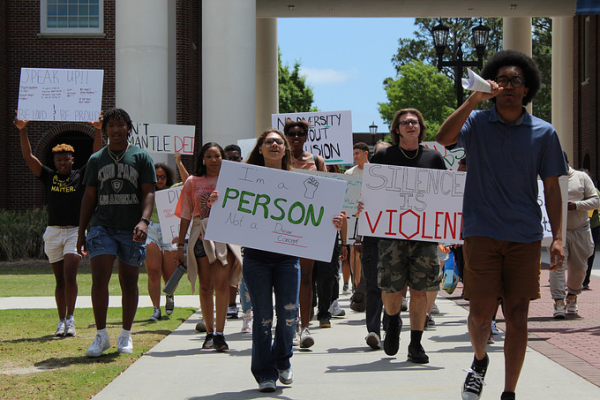Getting to know Brent Campbell
August 5, 2013
It took Brent Campbell 17 minutes to write his letter. 17 minutes to detail the harassment he endured, to convey his pain and frustration, to illustrate strained race relations in America, and to forgive those who lashed out on him.
In a little over a quarter of an hour, Campbell made his emotions and wishes public as a wake up call to UNC Wilmington. What most students read, however, was a statement issued by the Chancellor that filtered Campbell’s situation to its bare bones.
On July 22 Campbell went to practice for a new track season on the Intramural Fields, as he usually does over the summer. What wasn’t quite as usual was a blue pickup truck with five white men, tailing him and hurling racial insults.
Eventually, the men disappeared for awhile. Then the truck returned with only the driver and passenger. The driver threatened to injure Campbell if he ever saw him again before driving off.
At first, Campbell shrugged off the initial verbal assault. However, the driver’s threats left him shaken.
“It seemed like he was the one that really meant that down to his core,” Campbell said. “There was a lot of hate there, and I don’t think I saw that much unprovoked hate before.”
Despite the perpetrator’s unhinged animosity, Campbell felt retaliation was not an answer to his situation. So, he sublimated his pain into a letter and contacted the authorities.
Soon, a school-wide statement and search for the perpetrators ensued. Campbell deemed the campus authorities’ efforts as better than he’d anticipated, but a key factor in their actions was missing.
“I’ll put it like this: they responded as well as I thought they would,” Campbell said. “To say that I was completely satisfied, that wouldn’t be completely true.”
Part of what muddied students’, and Wilmington residents’, understanding of Campbell’s severe situation was failing to include his letter.
“They released a statement, but my letter, my feelings about it, the whole heart of why it happened-what I wanted to see from it-none of that was mentioned,” Campbell said.
“Brent was very level-headed about what happened and how he wanted it handled by the university,” says Dean of Students, Michael Walker. “He chose to convey the account of the incident to local media, and discussed his plans to do so with the UNCW administration [who were in support of his decision to do so].”
Walker explained that crimes of such an aggressive nature are not easy to gauge, since they are not frequently reported. Walker noted the importance of Campbell’s coming forward, because it encourages awareness of these particular situations.
In addition to the ongoing investigation, Walker said that Campbell’s situation will be discussed during the next Chancellor’s Safety and Security council meeting.
Although Campbell’s letter is accessible through the internet, a large number of people have neglected to read it. According to Campbell, this same population labels his harassment as a hoax or embellishment. Campbell notes that this is a fairly common problem when it comes to race relations.
“There’s this underlying conversation in America right now about how black people in general, and all races that aren’t white, are just oversensitive-that we talk about race too much, and that’s why we can’t get over it,” said Campbell.
Campbell said that some people have told him that he’s “the problem with racism-” that his level-headed response to an aggressive situation smells like a ruse to support some sort of self-sponsorship. A few media publications even mildly word his predicament as a “taunting.” Campbell says that such connotations make the matter sound like “a little harmless teasing on the playground.” Despite some public backlash and trivialized accounts, Campbell anticipated these types of responses.
“So even a nice white person, unless they’ve gone out of their way to understand the struggle of a minority in America, they’re going to be oblivious to real racism,”said Campbell. “So to them, something that happened to me is either a hoax, embellished, or-if it’s true-downplayed in the media. In the end, that’s what I expect.”
Campbell has lived in Wilmington for the past 10 years, and said that his stay has desensitized him from both overt and covert racism, for better or worse. He remembers in seventh grade that his white classmates refused to invite him to their homes or even call him.
“You know, not being able to call them. Literally, we’d have a project, and they’d say, ‘You can’t call me, because you’re black.’ They had no filter. By the time I got here, you just gotta have some tough skin,” said Campbell.
It took more than just tough skin for Campbell to sit down and write his letter. In the end, he attributed his motivation to forgiveness. He holds no grudge for ill-will toward the driver of the group who verbally assaulted him. He also said he wrote the letter for him. “I should’ve started with that,” he said.
Campbell said that society’s failing to unite leads back to relations, not only with race, but as people. He explained that mere tolerance has weakened human intimacy and compassion for one another. He said that love cannot form in a community that breeds modest resilience and so instead, he chose to forgive and love.
In his letter, he detailed only one consequence for the driver of that pickup truck, and that was for him to get to know Brent. He hasn’t changed his mind after two weeks.
“I hope I do get to talk to him. In the end, I would say I forgive him. It’s not completely altruistic, because it puts him in my debt. He has to acknowledge that I forgave him, and he has to forgive other people,” said Campbell.
You can read Campbell’s letter on his Facebook page, that is open to the public.














